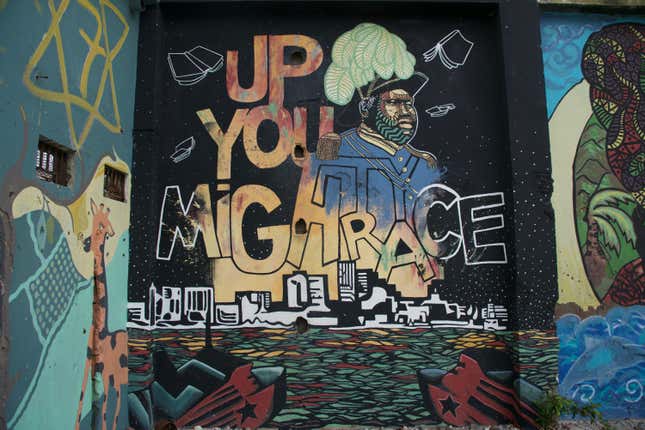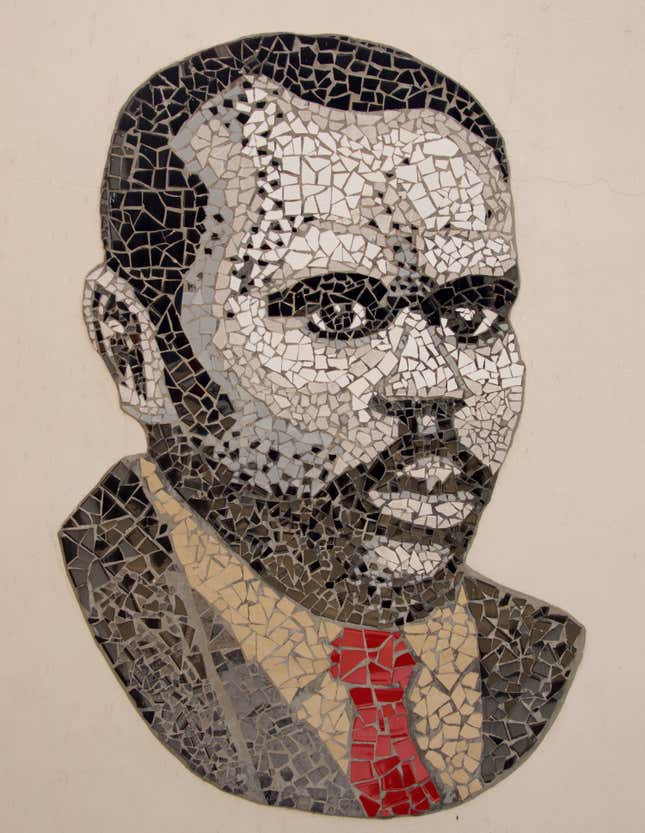Martin Luther King called Marcus Garvey the first man “to give millions of Negroes a sense of dignity and destiny.” His philosophy of black self-determination influenced black leaders from Nelson Mandela to Jomo Kenyatta to Malcolm X.
At a time when lynchings still occurred, Garvey was a firebrand who turned soapbox speeches on a Harlem street corner into a mass movement for black rights. By 1920, just six years after arriving in the United States from his native Jamaica, he had organized the largest ever march of black people on the streets of Harlem. People called him the “Black Moses”—the man who would lead them out of the downtrodden legacy of slavery.
But instead of achieving lasting global celebrity like those he inspired, Garvey faded into obscurity, his name one that might seem only vaguely familiar except to those well-versed in black history.

Now a movement is underway to restore Marcus Garvey’s legacy by asking US president Barack Obama to issue a pardon for what many consider to be Garvey’s wrongful conviction for mail fraud. Supporters include the families of Martin Luther King, Nelson Mandela, and Bob Marley. Jamaica’s prime minister Andrew Holness also supports the effort.
“The time has come when he should be exonerated,” he said during a visit to New York earlier this year.
A presidential pardon for Garvey would be especially symbolic today, with the rise of the Black Lives Matter movement, advocates say.
Benjamin Crump, a lawyer who has represented several black families including those of Trayvon Martin, Michael Brown, and Tamir Rice, said the effort is especially symbolic against the backdrop of the Black Lives Matter movement.
“We know now more than ever that this notion that black lives matter, that black experiences matter is at the crux of the national conversation,” Crump said.
“In many ways, when you see the young people standing up and taking a stand, it harkens back to what Garvey was trying to do over 100 years ago.”
Garvey and the UNIA
At the heart of Garvey’s philosophy and his trouble with the law was the Universal Negro Improvement Association (UNIA), which the 26-year-old Garvey founded in Kingston, Jamaica in 1914. The UNIA was a product of Garvey’s time and place. Although slavery had been abolished in the 1830s, Garvey came of age in a country where blacks still struggled under a system of land ownership that favored the descendants of white plantation owners.
Blacks needed their own government, their own economy, and their own organizations to be successful in a world that oppressed and marginalized them, Garvey argued. He pictured an explosion of black enterprise from trade within the global black diaspora, and a Pan-African government.

When he moved to the United States in 1916, Garvey found fertile ground for his philosophy in a country where job shortages were causing racial friction in the north and blacks in the Jim Crow south were still subject to vigilante “justice” at the hands of white mobs.
Garvey’s answer to escape the suffering: look to Africa. He founded a shipping company called the Black Star Liner Corporation whose mission was to help the African diaspora trade and, ultimately, to help black people return to the continent.
Hoover and the Black Star Liner
Garvey’s huge following caught the eye of J. Edgar Hoover, of the Federal Bureau of Investigation, who was heading up efforts to arrest and deport suspected Communist and radicals in the U.S. Hoover described Garvey as “one of the most prominent negro agitators in New York… an exceptionally fine orator, creating much excitement among the negroes through his steamship proposition.”
Alarmed at Garvey’s ability to “agitate,” Hoover decided to try to find a way to deport Garvey, even hiring the agency’s first black agent to spy on Garvey and the UNIA.
In a letter to the agency’s New York office in 1919, Hoover wrote of Garvey:
Unfortunately…he has not as yet violated any federal law whereby he could be proceeded against on the grounds of being an undesirable alien, from the point of view of deportation. It occurs to me, however, from the attached clipping that there might be some proceeding against him for fraud in connection with his Black Star Line propaganda and for this reason I am transmitting the communication to you for your appropriate attention.
Hoover’s plan worked – Garvey was convicted of mail fraud in 1923 in a decision that is now considered by at least some historians to have been trumped up.
“Garvey’s conviction on a charge of mail fraud was basically a technicality,” Barbara Bair, a curator and public historian with the Library of Congress, said in a PBS question and answer session on Garvey’s life, and quoted Garvey’s own assessment in 1923 when he said the case against him “involves not Marcus Garvey but the existence of the Universal Negro Improvement Association (U.N.I.A.). The ideals of the Universal Negro Improvement Association are on trial.”
The allegations against Garvey were tied to the representation of the Black Star Line on promotional materials to sell stock in the company. An image of the ship appeared on the advertisements even though the ship was under construction at the time and not yet officially owned by the UNIA.
Exile
Garvey spent two years in a U.S. jail and, although President Calvin Coolidge commuted his sentence in 1927 under public pressure, Garvey was deported and never allowed back into the United States.
He was welcomed back to Jamaica with throngs of supporters in 1927, but Garvey’s U.S. criminal record dogged him in the following decades.
“For a long time, there was a concerted effort to smear Garvey… even in Jamaica, up to my generation, people were talking about, ‘Garvey is a con man,’” said Steven Golding, the president the UNIA in Kingston, who is in his 40s.
US influence also made Garvey’s life difficult elsewhere. For instance, the UNIA had secured a land grant in Liberia which was later withdrawn, only to be reassigned to the US-based Firestone Rubber Company.
The United States wasn’t the only country to make Garvey a persona non grata. Garvey’s efforts to go to Africa were stymied by colonial governments wary of his organizing efforts.
“They didn’t want him there because they feared what his presence there would do,” Golding said. Garvey did, in fact, influence several people who led decolonization efforts in Africa including Nelson Mandela, Kwame Nkrumah, Jomo Kenyatta, and Kenneth Kaunda, the UNIA’s Golding said.
Even back in Jamaica, his defiance landed him in hot water. He was charged with contempt of court when he suggested that corrupt judges should be brought to heel.
Garvey’s conviction in the U.S. turned out to be the beginning of a slow unravelling that marginalized him globally and ended in London in 1940 when he died after the sight of his own obituary in the paper triggered a heart attack.
Redemption?
In 1964, two years after Jamaica won independence, Garvey’s body was brought back to Jamaica for burial and he was declared the nation’s first national hero.
Last month, Jamaica took the first step in clearing the names of all of its national heroes, including Garvey. All of Jamaica’s national heroes are freedom fighters from Sam Sharpe, who led one of the country’s most important slave uprisings, to Norman Manley, the first Prime Minister of independent Jamaica. Some were sentenced to death by the Crown for treason after organizing slave revolts or protests.
Jamaica is hoping that expunging the records of its national heroes will set an example for the U.S.
“We have an opportunity to make a definitive statement to the international community with the passing of this Bill,” Olivia Grange, Jamaica’s minister of culture said in a statement to parliament last month.
A previous bid to get a posthumous pardon for Garvey failed in 2011 when the Obama administration said it would only grant pardons to the living.
Posthumous pardons are rare, but not unprecedented. Bill Clinton issued a pardon to Henry O. Flipper, a former slave who was also the first black West Point cadet charged with conduct unbecoming an officer. George W. Bush pardoned a man named Charles Winters for smuggling bombers into Israel in the 1940s.
For Crump, pardoning Garvey would send the message that standing up against racial discrimination will not be prosecuted.
“Now they are starting to call Black Lives Matter, in certain circles, a terrorist group. It’s no different than what they did 100 years ago with Marcus Garvey,” Crump said.
“This pattern and practice of discrimination against people who stand up for their rights and declare that ‘My life matters too,’ is something that continues to this day.”
